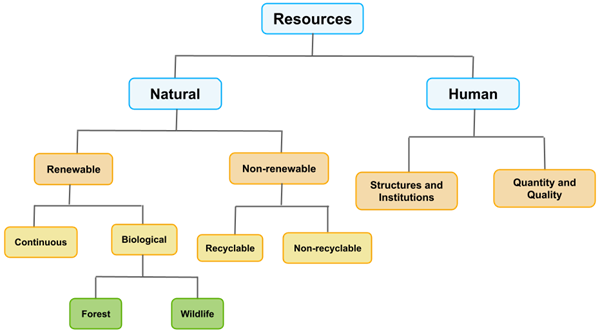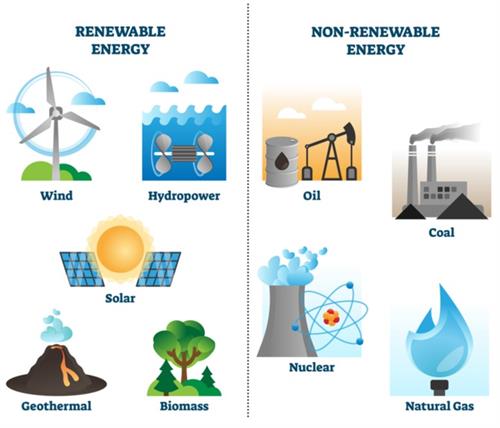
PUMPA - SMART LEARNING
எங்கள் ஆசிரியர்களுடன் 1-ஆன்-1 ஆலோசனை நேரத்தைப் பெறுங்கள். டாப்பர் ஆவதற்கு நாங்கள் பயிற்சி அளிப்போம்
Book Free DemoThe types and classification of natural resources are given below:

Classification of resources
- Renewable resources: Resources present in unlimited or infinite quantities in nature and which can be used repeatedly are known as renewable resources. Examples of renewable resources include solar energy, hydroelectric power, wind energy etc.
- Non-Renewable resources: Resources that are limited in quantity and can be exhausted by human activity in the future are known as non-renewable resources. Examples of non-renewable resources include fossil fuels like coal, petroleum, natural gas etc.

Renewable and non-renewable energy resources
Importance of natural resources:
- Natural resources such as land, forest, and water provide a livelihood to millions.
- They aid in raising food crops and other natural foods.
- Export of minerals assists and earn foreign exchange to the country.
- Natural resources such as forests help to prevent soil erosion and add beauty to the environment.
- Economic development in developing countries is heavily reliant on natural resources.
Need for resource management:
Renewable resources can be renewed at the same time that they are exploited (forests, crops, wildlife, groundwater, wind and solar energy). They can be maintained through natural recycling or can be replenished through proper management.
On the other hand, non-renewable resources cannot be recycled. They can be depleted if used indefinitely (mineral ores, coal, petroleum etc.). They are difficult to replace, resulting in a situation where non-renewable resources run out after a specific amount of time. Thus, natural resources need to be used carefully.
Since natural resources are not unlimited, and with the increasing human population, the demand for resources increases exponentially. We can see that the natural resources are recycled again and again on the earth for continuous use.
Expanding human population resulted in expanding needs of man. With scientific and technological advancement, humans started utilizing natural resources on a much larger scale. Thus, the management of resources must be an inherent component of our society to maintain a sustainable, equitable allocation of resources and reduce environmental damage.
Important!
Continuous increase in population caused an increased demand for resources. Therefore, the conservation of natural resources makes important contributions to the social and economic development of the country.